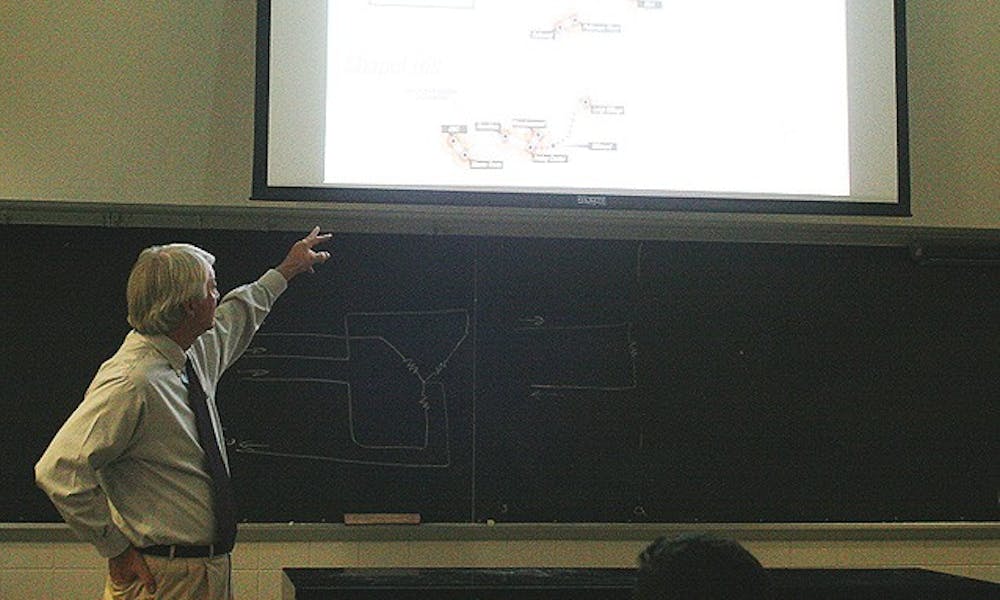This fall, buses and trains will make their way into Triangle area ballot boxes.
Durham County residents will vote Nov. 8 on a referendum concerning transit in the area. If the referendum passes, an additional half-cent sales tax will be imposed on various goods, and the resulting tax revenue will be used to provide improved public transportation throughout the local and regional areas, including a light rail system said David King, Triangle Transit CEO and general manager. Goods and expense that will not be subject to this potential tax include food, medicine, gasoline, utilities and housing costs.
“The Triangle is expecting an additional 1.2 million people in the next 20 years,” he said. “We are on the verge of choking on our own success. Our high quality of life is at risk.”
King spoke at a sparsely attended information session on the proposed tax increase Monday afternoon.
Transportation Demand Coordinator Brian Williams said that though he cannot comment as to whether the University supports this referendum, he believes an increase in offerings would generally promote an increase in use.
“The more options students have, the more likely they would use public transportation,” Williams wrote in an email Tuesday. “Duke Parking and Transportation works with the city of Durham and transit providers to make it easier for Duke students to get around without needing a car.”
The half-cent increase would raise sales tax in Durham County from 6.75 percent to 7.25 percent. If the referendum passes this November, Orange and Wake County residents may consider a similar half-cent sales tax for transit in 2012.
Under the proposed transportation projects, the Bull City Connector would undergo major improvements in the next 18 months, King said. Buses will run every 10 minutes and be larger in capacity. By 2018, a commuter rail system would span from the Duke Hospital to Raleigh as well as several other cities in the Triangle. In the following six years, there would be a 20-mile light rail system running through the entire metropolitan Triangle area.
“Of the total buying and consuming public, 20 to 30 percent would like to have [public transit],” King said. “We are only supplying 5 percent. The market would like more transit than we are [currently] giving.”
King noted the continued growth of the Triangle area will be stifled and wasted if more transit options are not introduced soon. Similarly, congestion will become unmanageable—a hindrance on the region’s productivity.
Senior Will Reach, president of the Duke College Republicans, said that he believes cars and congestion are not the area’s most pressing issue and is opposed to the referendum. Reach noted low ridership on the Bull City Connector and the guaranteed ridership of University buses as reasons for why this tax increase is unnecessary.
“It is unfair to the single mother with two kids to increase her school expenses and clothing costs simply because we’re growing an institution while everyone else is tightening their belts,” Reach said.
But in addition to providing convenience to Durham County residents, King added that the proposed tax will stimulate the regional job market, noting that the commuter rail construction and maintenance would produce 2,000 jobs and the light rail project would produce 4,400.
The project could have environmental benefits as well. The transit system would attempt to encourage Triangle commuters to forgo using their automobiles in favor of buses and trains and could promote more compact development around transit stations, King said.
Freshman Sterling Gutierrez said, however, that there is an apparent lack of knowledge and opinion regarding the referendum at Duke.
“I haven’t used public transportation often,” Gutierrez said. “But I don’t think many students are even aware that there is a referendum. There isn’t much publicity on campus.”
Duke students, however, do have a role in local environmental decision-making, said Michelle Nowlin, senior lecturing fellow and supervising attorney for Duke’s Environmental Law and Policy Clinic.
“I think it’s important to emphasize that students can have a significant effect on environmental issues and the future of the region, even though they’re here for a relatively short time,” she noted.
Nowlin, who was in attendance at the event Monday, added that the opportunities for students in Raleigh and Chapel Hill are continually expanding and that wider transit options would allow more students to access these opportunities.
Correction: In a previous version of this article, it was stated that the current sales tax in Durham County is 7.25 percent. The sales tax in Durham County is currently 6.75 percent. If the transit tax passes, Durham County sales tax would be increased 7.25 percent, not 7.75 percent as previously reported. The Chronicle regrets the error.
Get The Chronicle straight to your inbox
Signup for our weekly newsletter. Cancel at any time.

